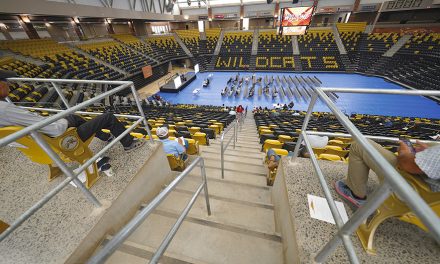
50 Years Ago: Nakai supports bill of rights but opposes national measure
Just a week after the Navajo Tribal Council approved a Navajo Bill of Rights, which was supported by the tribe’s chairman, Raymond Nakai, he went on record as opposed to a national Indian Bill of Rights that a southern senator is trying to get Congress to pass.
Confusing? Yes, but Nakai says the national bill, which guarantees to Native Americans freedom of speech, religion, press and assembly like the Navajo one, will take away a lot of the tribal government’s power.
But he has little to worry about because it seems that members of Congress could care less about protecting the rights of the country’s Native Americans. The senator making all of the fuss is Sam J. Ervin Jr., a Democrat from North Carolina. Erwin, of course, would gain national attention just a few years later as head of the committee that investigated Richard Nixon in the Watergate scandal.
But in 1967, he was known mainly for his support of civil liberties and one of his causes centered on American Indians. Erwin was trying to get an amendment placed in the 1967 Civil Rights Act that would protect the nation’s Native population and in mid-October was trying to convince the Senate Judiciary Committee to support the amendment. But the committee voted 8-7 against it, thus killing the proposal.
But Nakai said he wanted no part of the amendment because it would give states jurisdiction over crimes committed on Indian reservations by members of that tribe.
The bill had a provision to protect tribal governments which required tribes to give their approval before states could take over this authority but Nakai said he was afraid that once states got a chance to takeover anything in Indian Country, they would eventually find a way to do it with or without the consent of the tribal governments. Besides, he said, tribal members now had these rights protected under the bill approved by the tribal Council the week before.
In other news, United Nuclear Corp. made an announcement that got scant attention from most Navajos but its aftermath, even today, is still debated.
The company said it has begun construction to sink the first of two 1,800-foot shafts some 16 miles northeast of Gallup near the border of the Navajo Reservation. But the company did not go as far as saying that they planned to develop a uranium mine there, at least in the near future.
Officials for the company said that while they have a lot of land in that area and they have been doing exploratory drilling for more than a year and have found a major ore body, they “have reached no conclusion regarding a mine.”
The Times had reported the month before rumors that the company was planning to build a mill there once a mine was developed but a statement from the company said no plans have been made to build a mill there “since we haven’t even decided about a mine yet.”
There were also reports that Kerr-McGee was also looking at the Church Rock area as a possible location for a uranium mine as well. The big news this week came in a short statement from the Office of Navajo Economic Opportunity’s board of directors.
They were going to shut down DNA, the legal aid program in the Four Corners region. “It was apparent that funds are not available to continue the Legal Services Program,” the release said.
“It was also apparent (DNA) did not conduct and administer the legal services department to the satisfaction of the ONEO Executive Board.” DNA officials were told to shut their doors at the end of business on that day.
But that did not mean the end of legal services for the poor on the reservation, the statement said. What was going to happen was that following day, talks would begin to create a new legal aid services program that would be a more “effective” operation and would serve the Navajo people better.
The person behind all of this seems to be the director of ONEO himself, Peter MacDonald, who said that the contract to operate DNA had expired the previous August and since there was no new contract, DNA officials could do nothing. Since then DNA has been operating on a temporary grant and MacDonald said all of that money has been used up. What they could do was protest and that is what they did.
Ted Mitchell, DNA’s director, blamed the whole business on what he called “the MacDonald boys” and said the reason why the new contract hasn’t been signed is because it has been sitting on MacDonald’s desk since September waiting for him to take action. As that issue of the Navajo Times was going to press, the day after MacDonald’s statement, Mitchell was holding a meeting in the recreation hall in Window Rock. The hall was packed with DNA’s chapter elected representatives.
Mitchell denounced MacDonald, accusing him of working in secret to get rid of DNA. He pledged to find a way to keep the doors open. “We can’t even pay the light bill unless we all chip in,” he said.
“Here we are without any money. We are pushed to the wall.” As the paper went to press that week, things looked very grim for Mitchell and the attorneys at DNA.
To read the full article, pick up your copy of the Navajo Times at your nearest newsstand Thursday mornings!
Are you a digital subscriber? Read the most recent three weeks of stories by logging in to your online account.







 Highway 264,
Highway 264, I-40, WB @ Winslow
I-40, WB @ Winslow